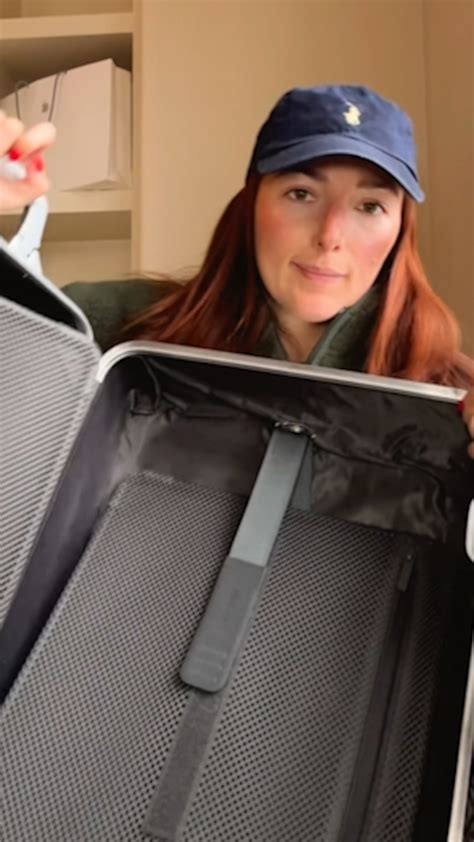
A former flight attendant is advising travelers to pack essential items like medications, valuables, and crucial documents in their checked baggage rather than carry-ons, a counterintuitive strategy designed to mitigate potential disruptions caused by lost or delayed luggage.
A former flight attendant has upended conventional travel wisdom by suggesting that passengers should pack essential and irreplaceable items in their checked baggage, despite the risk of luggage delays or loss. Katrina, a former cabin crew member, argues that this approach can actually reduce stress and potential problems if travel plans are disrupted.
Katrina’s advice, detailed in a recent interview, centers around the idea that items critical to one’s well-being and trip continuation are best placed in checked luggage. This includes medications, important documents, and valuable possessions. The rationale behind this seemingly counterintuitive strategy stems from the increasing frequency of flight delays and cancellations, which often result in passengers being separated from their carry-on luggage.
“It might sound strange, but hear me out,” Katrina explained. “If your flight gets canceled or you’re rerouted, there’s a high chance your carry-on might get gate-checked. If that happens, you won’t have access to those essential items until you reach your final destination, which could be days later.”
The primary concern Katrina raises is the unpredictability of air travel in the current environment. Flight delays and cancellations are common occurrences, frequently leading to passengers being asked to gate-check their carry-on bags due to limited space in the overhead bins. When this happens, passengers lose immediate access to their belongings, which can be particularly problematic if they have essential medications, important documents, or valuable items stored in their carry-ons.
According to Katrina, essential medications are a top priority for packing in checked baggage. “Imagine being stuck in a different city for two days without your prescription medication,” she said. “That could be a serious health risk.” Similarly, important documents such as passports, visas, and travel itineraries should also be placed in checked luggage to avoid the risk of losing them if a carry-on is misplaced or delayed.
Valuable possessions, including jewelry, electronics, and sentimental items, should also be packed in checked baggage, according to Katrina. While this may seem risky, she argues that these items are often better protected in a well-packed suitcase than in a carry-on bag that could be easily stolen or lost. Moreover, if a carry-on is gate-checked, there is a greater risk of these items being damaged during handling.
Katrina acknowledges that there is a risk of checked luggage being lost or delayed. However, she argues that the potential consequences of being separated from essential items are often more severe than the inconvenience of delayed baggage. To mitigate the risk of lost luggage, she recommends taking several precautions, including using durable luggage with clear identification tags, taking photos of the contents of your suitcase, and purchasing travel insurance that covers lost or delayed baggage.
“Of course, there’s always a risk of your checked luggage getting lost, but that’s why it’s important to take precautions,” Katrina said. “Use a sturdy suitcase with a clear luggage tag, take photos of what’s inside for insurance purposes, and consider getting travel insurance.”
The response to Katrina’s advice has been mixed, with some travelers praising her unconventional approach and others expressing skepticism. Some frequent flyers argue that they would never risk packing essential items in checked baggage, citing concerns about theft, damage, and delays. However, others have acknowledged the validity of Katrina’s concerns, particularly in light of the increasing frequency of flight disruptions.
A seasoned traveler, Mark Thompson, commented, “I used to be a staunch carry-on-only advocate, but after experiencing a recent flight cancellation that left me stranded without my medication for 24 hours, I’m starting to see the logic in Katrina’s advice. It’s a calculated risk, but it might be worth it for the peace of mind.”
Experts in the travel industry also weigh in on this debate, offering a balanced perspective. While acknowledging the potential benefits of packing essential items in checked baggage, they also emphasize the importance of taking precautions to protect against lost or delayed luggage.
“Katrina’s advice is thought-provoking and relevant, especially given the current state of air travel,” said Emily Carter, a travel consultant. “However, it’s crucial to weigh the risks and benefits carefully. Make sure you have adequate travel insurance, use durable luggage, and keep a detailed inventory of your belongings.”
The debate surrounding Katrina’s advice highlights the evolving challenges of modern air travel and the need for passengers to adapt their strategies to mitigate potential disruptions. While there is no one-size-fits-all solution, her perspective offers a valuable alternative for travelers seeking to minimize stress and ensure access to essential items, even in the face of unexpected delays or cancellations. By carefully considering the risks and benefits, and taking appropriate precautions, passengers can make informed decisions about how to pack their luggage and prepare for the uncertainties of air travel.
In conclusion, Katrina’s unconventional advice challenges the traditional approach to packing for air travel. By suggesting that essential items be placed in checked baggage, she prompts travelers to consider the potential consequences of flight disruptions and the importance of having access to critical medications, documents, and valuables. While this strategy may not be suitable for all travelers, it offers a valuable alternative for those seeking to minimize stress and prepare for the unexpected challenges of modern air travel. Ultimately, the decision of how to pack one’s luggage depends on individual circumstances, risk tolerance, and travel priorities.
Detailed Breakdown and Contextual Information
Katrina’s suggestion to pack essential items in checked baggage comes at a time when the airline industry is grappling with numerous operational challenges, including staffing shortages, increased demand for travel, and unpredictable weather patterns. These factors have contributed to a surge in flight delays and cancellations, leaving many passengers stranded and separated from their belongings.
The traditional advice for air travelers has always been to keep essential items in their carry-on luggage, ensuring they have immediate access to medications, documents, and valuables. This approach is based on the assumption that carry-on bags are less likely to be lost or delayed compared to checked luggage. However, the increasing frequency of gate-checking carry-on bags has challenged this assumption, forcing passengers to reconsider their packing strategies.
Gate-checking occurs when passengers are required to check their carry-on bags at the gate due to limited space in the overhead bins. This is a common practice on crowded flights, particularly those operated by regional airlines with smaller aircraft. When a carry-on bag is gate-checked, it is placed in the cargo hold and is not accessible to the passenger until they reach their final destination.
The risk of gate-checking is particularly concerning for passengers who rely on prescription medications. Being separated from essential medications for an extended period can have serious health consequences, especially for individuals with chronic conditions. Similarly, losing access to important documents such as passports and visas can create significant problems for travelers attempting to navigate international borders.
Katrina’s advice aims to address these concerns by suggesting that passengers proactively pack essential items in their checked baggage. While this approach carries the risk of luggage delays or loss, it also ensures that passengers have access to their critical medications, documents, and valuables if their carry-on bags are gate-checked.
To mitigate the risk of lost or delayed luggage, Katrina recommends several precautions. First, she advises travelers to use durable luggage with clear identification tags. A sturdy suitcase is less likely to be damaged during handling, and a clear luggage tag increases the chances of it being returned if it is lost. Second, she suggests taking photos of the contents of the suitcase. This can be helpful for insurance purposes in case the luggage is lost or damaged. Third, she recommends purchasing travel insurance that covers lost or delayed baggage. Travel insurance can provide financial compensation for expenses incurred as a result of luggage delays or loss.
In addition to these precautions, travelers can also take steps to minimize the risk of their carry-on bags being gate-checked. This includes arriving at the airport early to secure a spot in the overhead bins, packing efficiently to reduce the size and weight of their carry-on bags, and avoiding bringing oversized or unusual items that may not fit in the overhead bins.
The debate surrounding Katrina’s advice highlights the importance of adaptability and preparedness in modern air travel. There is no one-size-fits-all solution to packing for a flight, and travelers must carefully consider their individual circumstances, risk tolerance, and travel priorities. By weighing the risks and benefits of different packing strategies and taking appropriate precautions, passengers can minimize stress and ensure a smoother travel experience.
One of the key considerations in deciding whether to pack essential items in checked baggage is the length and complexity of the trip. For short, domestic flights, the risk of luggage delays or loss may be relatively low, making it more practical to keep essential items in a carry-on bag. However, for longer, international flights with multiple connections, the risk of luggage delays or loss may be higher, making it more prudent to pack essential items in checked baggage.
Another important consideration is the availability of backup options. If a traveler has a reliable network of friends or family at their destination, they may be able to obtain replacement medications or documents if their luggage is delayed or lost. However, if a traveler is traveling to a remote or unfamiliar location, it may be more difficult to obtain backup options, making it more important to pack essential items in checked baggage.
Ultimately, the decision of how to pack one’s luggage is a personal one that depends on a variety of factors. By carefully considering these factors and taking appropriate precautions, travelers can make informed decisions that minimize stress and ensure a smoother travel experience.
Expanded Context and Alternative Perspectives
While Katrina’s advice offers a valuable perspective, it is important to consider alternative viewpoints and potential drawbacks. Some travel experts argue that keeping essential items in a carry-on bag is still the best approach, particularly for frequent flyers who have developed strategies for avoiding gate-checking and minimizing the risk of lost luggage.
These experts argue that the convenience and peace of mind of having immediate access to essential items outweigh the potential risks of gate-checking or luggage delays. They also point out that many airlines offer tracking services that allow passengers to monitor the location of their checked luggage, making it easier to recover lost or delayed bags.
Another argument against packing essential items in checked baggage is the risk of theft. While it is true that suitcases can be stolen from baggage carousels or during transit, the risk of theft is generally lower than the risk of losing a carry-on bag, which can be easily misplaced or stolen in crowded airports or on airplanes.
Furthermore, some travelers may have medical conditions that require them to have immediate access to certain medications or medical devices. For these individuals, packing essential items in checked baggage is simply not an option.
In light of these alternative perspectives, it is important to approach Katrina’s advice with caution and consider individual circumstances before making a decision about how to pack one’s luggage.
Practical Tips for Mitigating Risks
Regardless of whether you choose to pack essential items in your carry-on or checked baggage, there are several practical tips you can follow to mitigate risks and ensure a smoother travel experience:
-
Use durable luggage: Invest in a high-quality suitcase with reinforced seams and sturdy zippers. This will help protect your belongings from damage during handling.
-
Use clear identification tags: Attach a luggage tag to your suitcase with your name, address, email address, and phone number. This will increase the chances of your luggage being returned if it is lost.
-
Take photos of the contents of your suitcase: This can be helpful for insurance purposes in case your luggage is lost or damaged.
-
Purchase travel insurance: Travel insurance can provide financial compensation for expenses incurred as a result of luggage delays or loss.
-
Arrive at the airport early: This will give you more time to navigate security and find a spot in the overhead bins, reducing the risk of your carry-on bag being gate-checked.
-
Pack efficiently: Reduce the size and weight of your carry-on bag to minimize the risk of it being gate-checked.
-
Avoid bringing oversized or unusual items: These items may not fit in the overhead bins, increasing the risk of your carry-on bag being gate-checked.
-
Keep a copy of your prescription: This will make it easier to obtain replacement medication if your luggage is delayed or lost.
-
Inform your airline of any medical needs: If you have a medical condition that requires you to have immediate access to certain medications or medical devices, inform your airline in advance.
-
Track your luggage: Many airlines offer tracking services that allow you to monitor the location of your checked luggage.
By following these practical tips, you can minimize the risks associated with air travel and ensure a smoother and more enjoyable experience.
The Psychological Impact of Travel Disruptions
It’s also important to acknowledge the psychological impact of travel disruptions. Flight delays, cancellations, and lost luggage can cause significant stress and anxiety, particularly for individuals who are already dealing with the pressures of work, family, or other personal obligations.
The uncertainty and lack of control associated with travel disruptions can lead to feelings of frustration, helplessness, and even anger. These emotions can be particularly intense when travelers are separated from essential medications, documents, or valuables.
Katrina’s advice, while unconventional, can be seen as a way to regain some sense of control in the face of unpredictable travel conditions. By proactively packing essential items in checked baggage, travelers can reduce their vulnerability to potential disruptions and minimize the psychological impact of lost or delayed luggage.
However, it is important to acknowledge that this approach may not be suitable for everyone. Some travelers may find the risk of lost or delayed luggage to be too stressful, while others may have medical conditions or other circumstances that require them to keep essential items in their carry-on bags.
Ultimately, the decision of how to pack one’s luggage is a personal one that should be based on individual circumstances, risk tolerance, and travel priorities.
The Future of Air Travel and Packing Strategies
As the airline industry continues to evolve, it is likely that packing strategies will also need to adapt. Factors such as increasing passenger volume, tighter security measures, and the growing complexity of travel itineraries will continue to shape the way people pack for flights.
One potential trend is the increased use of technology to track and manage luggage. Airlines are already experimenting with technologies such as RFID tags and GPS trackers to improve the efficiency of baggage handling and reduce the risk of lost luggage.
Another potential trend is the development of more versatile and adaptable luggage options. Suitcases with built-in compartments for medications, documents, and electronics could make it easier for travelers to keep essential items organized and protected.
Ultimately, the future of air travel and packing strategies will depend on the ability of the industry to adapt to changing conditions and meet the evolving needs of travelers.
FAQ Section
Q1: Why would a former flight attendant suggest packing essential items in checked baggage, which seems counterintuitive?
A1: Katrina, the former flight attendant, suggests this because flight cancellations and rerouting are increasingly common. This can lead to carry-on bags being gate-checked, meaning passengers lose immediate access to essential items like medications, documents, and valuables until they reach their final destination, which might be delayed.
Q2: What specific items does Katrina recommend packing in checked baggage?
A2: Katrina specifically recommends packing essential medications, important documents (passports, visas, travel itineraries), and valuable possessions (jewelry, electronics, sentimental items) in checked baggage.
Q3: What if my checked baggage gets lost? Isn’t it safer to keep everything important with me in my carry-on?
A3: While there is a risk of checked baggage getting lost, Katrina argues that the potential consequences of being separated from essential items due to a gate-checked carry-on are often more severe. She recommends taking precautions like using durable luggage with clear identification, taking photos of the contents for insurance purposes, and purchasing travel insurance to mitigate the risk of loss.
Q4: How can I minimize the risk of my carry-on bag being gate-checked?
A4: To minimize the risk of gate-checking, arrive at the airport early to secure overhead bin space, pack efficiently to reduce the size and weight of your carry-on, and avoid bringing oversized or unusual items that may not fit in the bins.
Q5: What if I have a medical condition that requires me to have immediate access to my medication? Is this advice still applicable?
A5: If you have a medical condition that requires immediate access to medication, this advice may not be suitable. It’s crucial to prioritize your health needs and ensure you have access to necessary medications at all times. Consider discussing your travel plans with your doctor and exploring alternative strategies, such as carrying a doctor’s note and keeping medication in its original packaging. You may also need to inform the airline about your medical needs in advance.









